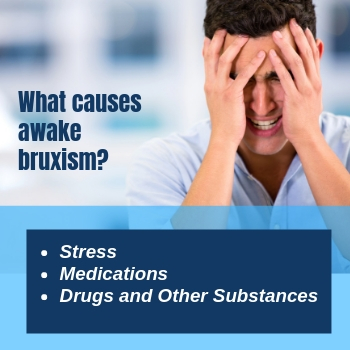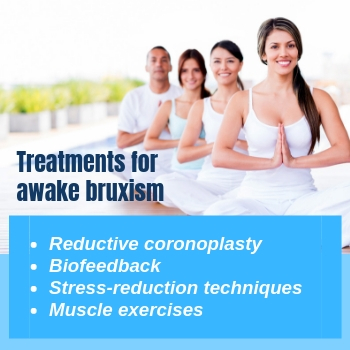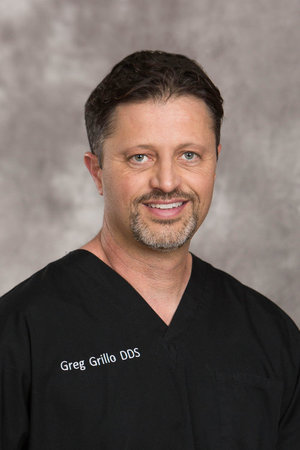Awake Bruxism | Causes and Treatment of Daytime Teeth Grinding

Awake Bruxism – Everything You Need to Know About Daytime Teeth Grinding
Bruxism is a common dental condition in people of all ages, affecting most people during the night while they’re sleeping. A less common form of bruxism is awake bruxism, which is less common among the general public. Much like nighttime bruxism, it involves the constant grinding or clenching of your teeth and affects around 10 percent of the population. Awake bruxism can lead to more serious conditions such as enamel degradation, tension headaches, jaw pain, and sometimes broken teeth. That’s why we’ve compiled research and have broken down all the information to help you if you’re living with this condition.
What causes awake bruxism?
There are a few different reasons you may be experiencing awake bruxism and what might put you at risk for the condition. They include:
Stress: Increased anxiety or stress can lead to teeth grinding. You may also experience awake bruxism due to anger, frustration or tension. Awake bruxism is unusually common in those with high-stress careers.
Medications: Awake bruxism may be a side effect of some psychiatric medications such as certain antidepressants.
Drugs and Other Substances: Many drugs and substances may increase your risk of developing awake bruxism. This includes smoking tobacco, drinking caffeine, consuming alcohol, and using recreational drugs.
Awake vs. nighttime bruxism
Awake and nighttime bruxism are classified similarly but are different as they operate through different mechanisms. Those who suffer from awake bruxism are not necessarily more likely to suffer from nighttime bruxism and vice versa.
Since awake bruxism occurs during the waking hours, it makes it much easier to diagnose than nocturnal bruxism which occurs during sleep. As mentioned, daytime teeth grinding affects 10 percent of the general population while nighttime bruxism affects only 5 percent. However, awake bruxism may not actually be more common than nighttime, but it is easier and more often diagnosed.
Treatments for awake bruxism
If you grind your teeth and are living with awake bruxism, there are things you can do to stop it. Some remedies may work better than others depending on the underlying cause of your teeth grinding symptoms.
Talk with your dentist or doctor to help guide you to your best solution for ending your bruxism.
Reductive coronoplasty: This is a dental procedure that may be used to reshape or level the biting surface of your teeth. If your teeth grinding is caused by crowded, misaligned, or crooked teeth this may be effective.
Biofeedback: Biofeedback is a technique designed to help people become aware of their awake bruxism and work to eliminate the behavior. A therapist will teach you how to control your jaw muscle through visual, vibratory, or auditory feedback from electromyography. However, research has shown that the effectiveness of biofeedback may only be short-term.
Stress-reduction techniques: Since it’s common for awake bruxism to be caused by stress and other mental health issues, stress-reductions techniques may help in some cases. Common techniques include meditation, yoga, talk therapy, and exercise. Try different methods to see if any benefit you.
Muscle exercises: Tongue and jaw muscle exercises can help you relax the jaw and facial muscles and maintain proper alignment of your jaw. Talk with physical therapists to see what exercises to try.
Awake Bruxism & Dementia
Neurological disorders such as Alzheimer’s disease put people at severe risk for awake bruxism. If you have a loved one so suffers from Alzheimer’s or dementia, be sure to check if they have developed awake or nighttime bruxism and find ways to help them.
You can begin by talking to your local dentist about a mouthguard to help minimize the grinding. A teething ring may also help.
Talk with their primary healthcare doctor to check their sugar levels. Sometimes, if sugar levels are high, the teeth grinding can be worse.
Frequently asked questions about awake bruxism
What do I do if my child has awake bruxism?
Bruxism is a common condition among young children. Most children will outgrow the conditions and while it affects more children during the night, some may be affected by awake bruxism. If your child develops a form of bruxism, talk with your doctor about different techniques to help control it. You may also consider using a mouthguard to help relieve the grinding. If left untreated, bruxism can cause future damage to your child’s jaw and teeth.
Why do I grind my teeth during the day?
There may be a few reasons why you’re grinding your teeth during the day. The most common cause of awake bruxism is stress and other mental health issues. If you’re feeling stressed, tense, or even anxious, consider different relaxation techniques and talking to your doctor or a counselor to find methods to relieve your teeth grinding symptoms.
How can I stop grinding my teeth in the daytime?
If you’re experiencing awake bruxism, there are some methods you can try to stop grinding your teeth during the daytime. Talk to your dentist or doctor about what might work for you. Some common remedies include mouthguards, therapy, and stress-reducing techniques such as meditation and exercise.
Medically Fact-Checked & Written by Our Dental Editorial Team
You can read more about our editorial guidelines by clicking this link and learn more about the Emergency Dentists USA editorial team here.




